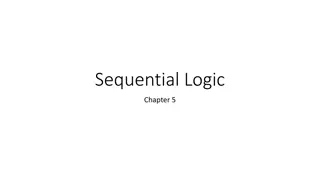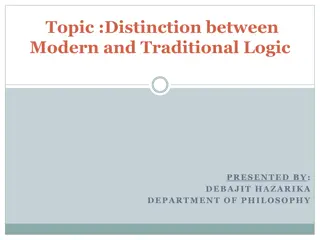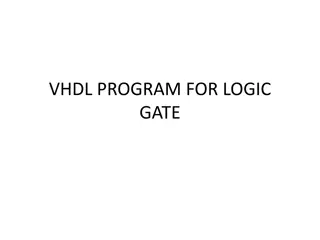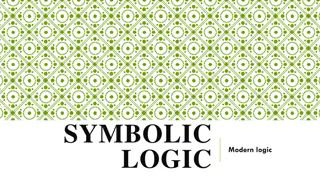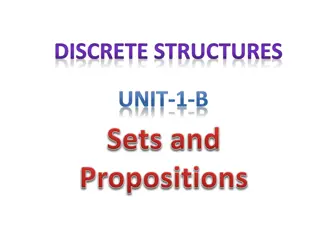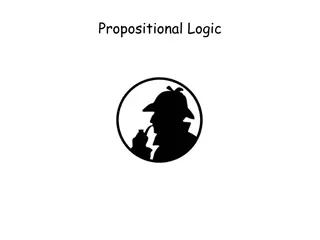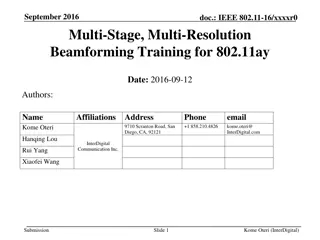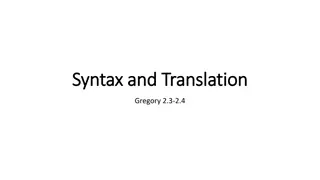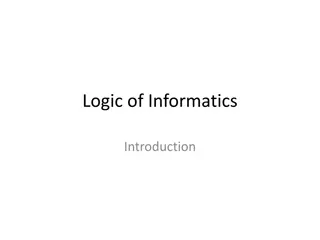Understanding Multi-Valued Logic in Three-Valued Systems
Explore the intricacies of multi-valued logic in three-valued systems, including Liberal and Draconian protocols. Learn how logical assertions and byte generation are influenced by the values of variables like a, b, u, and v.
Download Presentation

Please find below an Image/Link to download the presentation.
The content on the website is provided AS IS for your information and personal use only. It may not be sold, licensed, or shared on other websites without obtaining consent from the author. Download presentation by click this link. If you encounter any issues during the download, it is possible that the publisher has removed the file from their server.
E N D
Presentation Transcript
a | b a & b
a | b - true if a or b true or missing a & b true if a and b true or missing
assert ~mi(a) assert ~mi(b) gen byte c = a | b
a|b -- true if either a or b is true, regardless of what the other is a&b -- false if either a or b is false, regardless of what the other is
Three-valued logic or 0 1 . 0 0 1 . 1 1 1 1 . . 1 . and 0 0 1 . 1 0 1 . . 0 . . a 0 1 . not a 1 0 . 0 0 0
Three-valued logic, Liberal protocol or 0 1 . 0 0 1 0 1 1 1 1 . 0 1 . and 0 0 1 . 1 0 1 1 . 0 1 . a 0 1 . not a 1 0 . 0 0 0
Three-valued logic, Draconian protocol or 0 1 . 0 0 1 . 1 1 1 . . . . . and 0 0 1 . 1 0 1 . . . . . a 0 1 . not a 1 0 . 0 0 .
1 | . 0 | . 1 & . 0 & .
a|b -- true if either a or b is true, regardless of what the other is a&b -- false if either a or b is false, regardless of what the other is
1 | . 0 | . 1 & . 0 & .
Draconian: .b Unknown: .u Liberal: .v
(1 | .u) & .v = 1 (1 | .u) & .u = .u (1 | .b) & .U = .b
And Or Not | 0 0 1 .u .u 1 .u .u .b .v 0 1 .u .v .b .b .b .b .b .b .b 1 .u .v .b 1 .u 0 1 1 & 0 1 .u .v .b a ~a 0 1 .u .u .v .v .b .b 1 0 0 1 .b .b 0 1 .u 0 .v 0 .b .b .b .b .b .b 0 0 0 0 1 .u 1 .u .u .u .b 1 .u .v .b 0 .b .b 1
At least one child is female: f1 | f2 | f3 | f4 | f5 | f6 | f7 | f8 Every child is female: f1 & f2 & f3 & f4 & f5 & f6 & f7 & f8 At least one child is male: ~f1 | ~f2 | ~f3 | ~f4 | ~f5 | ~f6 | ~f7 | ~f8 Every child is male: ~f1 & ~f2 & ~f3 & ~f4 & ~f5 & ~f6 & ~f7 & ~f8
3 + . 7 + . 0 * . 12 / . sum(4, 17, 30, 12, .) mean(4, 17, 30, 12, .)
3 + .v = 3 3 + .b = .b Mean((4, 17, 30, 12, .u) = .u Mean((4, 17, 30, 12, .v) = 15.75 Mean((4, 17, 30, 12, .b) = .b
0 * .u = 0 12 / .u = .b
(12 + 3 + .v) * 2 = 30 (12 + 3 + .v) * .u = .u ((7 + .v) * 2 14) * .u = 0
.b .u Normal values .v
Multiplication Or And .b 0 .u All other numbers .v .b 1 .u 0 .v .b 0 .u 1 .v
Sup n Sup n-1 Sup 2 Sup 1 Normal values Inf 1 Inf 2 Inf k


